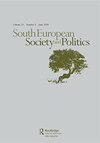又一个民粹主义政党?理解意大利兄弟的崛起
IF 4.6
1区 社会学
Q1 POLITICAL SCIENCE
引用次数: 5
摘要
从2012年开始作为一个边缘激进右翼分裂组织,在2022年大选中,“意大利兄弟党”(Fratelli d ' italia, FdI)成为投票最多的政党,其领导人乔治娅·梅洛尼(Giorgia Meloni)成为意大利第一位女总理。虽然领导人和政党都可以被归类为属于民粹主义激进右翼家族,但我们认为FdI也必须被理解为一个“根深蒂固的新人”,即一个可以依靠已有的组织资源的政党,在该党成立时也在选民已经熟悉的象征性元素上建立其吸引力。聚焦于供给面,我们解决了一些与该党矛盾性质相关的主要开放问题,该党经常在后法西斯形象和经常重申的对其他欧洲激进右翼非自由主义领导人和更温和立场的支持之间波动。我们认为,非自由主义政治是该党从反对党向政府过渡所面临的关键挑战。本文章由计算机程序翻译,如有差异,请以英文原文为准。
Yet Another Populist Party? Understanding the Rise of Brothers of Italy
ABSTRACT From its 2012 beginnings as a marginal radical right splinter group, in the 2022 general election ‘Fratelli d’Italia’ (Brothers of Italy, FdI) was the most voted party and its leader, Giorgia Meloni, became the first Italian female Prime minister. While both leader and party can be classified as belonging to the populist radical right family, we argue that FdI must be understood also as a ‘rooted newcomer’, i.e. a party that can count on pre-existing organisational resources, building its appeal also on symbolic elements already familiar to the electorate when the party was formed. Focusing on the supply side, we tackle some of the main open questions related to the party’s ambivalent nature, often fluctuating between a post-fascist profile and a frequently reiterated support for other European radical right illiberal leaders and more moderate positions. We identify the politics of illiberalism as the key challenge the party faces in its transition from opposition to government.
求助全文
通过发布文献求助,成功后即可免费获取论文全文。
去求助
来源期刊

South European Society and Politics
Multiple-
CiteScore
5.80
自引率
21.20%
发文量
14
期刊介绍:
A leading point of reference for scholars of Southern Europe, South European Society and Politics promotes both comparative and inter-disciplinary analyses, as well as offering innovative single county and sub-national studies. The journal acts as a forum for social, economic, cultural, contemporary historical and political approaches to research on the region, and is particularly keen to sponsor policy–focused studies in all these disciplines. The journal publishes research articles; South European Atlas with election reports and articles on other subjects of topical interest, and an extensive book reviews section, including both review articles and individual book reviews.
 求助内容:
求助内容: 应助结果提醒方式:
应助结果提醒方式:


